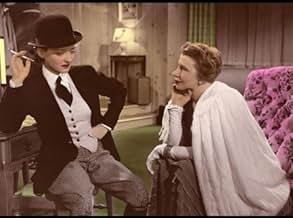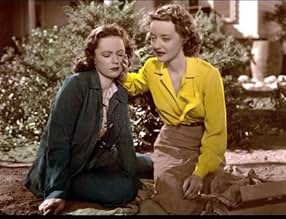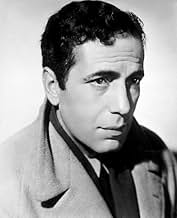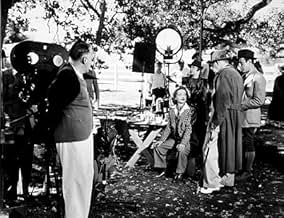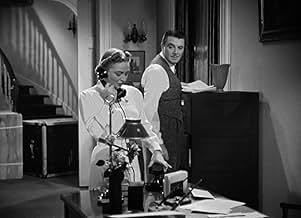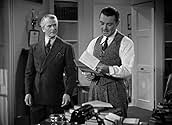AVALIAÇÃO DA IMDb
7,4/10
13 mil
SUA AVALIAÇÃO
Uma jovem socialite é diagnosticada com um tumor cerebral inoperável, e deve decidir se viverá ou não seus últimos dias com dignidade.Uma jovem socialite é diagnosticada com um tumor cerebral inoperável, e deve decidir se viverá ou não seus últimos dias com dignidade.Uma jovem socialite é diagnosticada com um tumor cerebral inoperável, e deve decidir se viverá ou não seus últimos dias com dignidade.
- Direção
- Roteiristas
- Artistas
- Indicado a 3 Oscars
- 5 vitórias e 4 indicações no total
Black Ace
- Judith's Horse
- (não creditado)
Marian Alden
- Judith's Friend
- (não creditado)
Wilda Bennett
- Judith's Friend
- (não creditado)
Diane Bernard
- Lucy - a Servant
- (não creditado)
- Direção
- Roteiristas
- Elenco e equipe completos
- Produção, bilheteria e muito mais no IMDbPro
Avaliações em destaque
Judith is a wealthy Long Island society girl given to a dizzy lifestyle
Self-assured of her affluence and her faculty over men, she is unprepared for tragedy, which strikes in the form of a brain tumor
The underlying bravery and courage with which she faces this physical suffering eventually demonstrates the woman of substance that she is
Among her friends is Ann King (Fitzgerald), her secretary, and handsome young Alex Hamm (Reagan), who directs her toward brain specialist Dr. Frederick Steele (Brent). The doctor diagnoses her illness as one which will end her life within a year Judith falls in love with him and accepts his proposal of marriage When she discovers that her tumor is calamitous, she rejects the doctor's proposal considering it an act with compassion
Davis provides scene after scene with the special magic only she was able of bringing vividly
Swept into the current of events was Bogart playing an Irish horse trainer, who fails in an attempt to make love to her, yet encourages her to enjoy her time with her true love, George Brent
The film was remade in 1963 as "Stolen Hours" with Susan Hayward, and as a 1976 TV movie under its original title with Elizabeth Montgomery
Among her friends is Ann King (Fitzgerald), her secretary, and handsome young Alex Hamm (Reagan), who directs her toward brain specialist Dr. Frederick Steele (Brent). The doctor diagnoses her illness as one which will end her life within a year Judith falls in love with him and accepts his proposal of marriage When she discovers that her tumor is calamitous, she rejects the doctor's proposal considering it an act with compassion
Davis provides scene after scene with the special magic only she was able of bringing vividly
Swept into the current of events was Bogart playing an Irish horse trainer, who fails in an attempt to make love to her, yet encourages her to enjoy her time with her true love, George Brent
The film was remade in 1963 as "Stolen Hours" with Susan Hayward, and as a 1976 TV movie under its original title with Elizabeth Montgomery
By today's standards, "Dark Victory" might seem cliched. Of course, that could be because it was so greatly copied! Here is Bette Davis, a star in the fullness of her talent and ability. Bette simply shines; she owns this film from first frame to last. Ably supported by a wonderful cast (including a somewhat mis-matched Humphrey Bogart as an Irish-brogued horse trainer), it is still difficult to watch the film and not be constantly anticipating Bette's appearance in any scene she isn't in. The ending, even in those days, might have turned out either wimpy or waspish. In Bette's hands, it is neither. It works in a way that literally drains one of emotions. I might also add that, while revealing only a bare back, Bette shows more sensuality than a dozen of today's more "open" actresses.
There is an old disparaging adage about "showing the full gamut from a to b," in this movie Bette not only shows A to Z, but some letters that haven't been invented yet.
Despite my gushing over Ms. Davis, the film is solid in all departments. If you wish to experience when melodrama is great movie-making, see this film.
There is an old disparaging adage about "showing the full gamut from a to b," in this movie Bette not only shows A to Z, but some letters that haven't been invented yet.
Despite my gushing over Ms. Davis, the film is solid in all departments. If you wish to experience when melodrama is great movie-making, see this film.
You've been feeling somewhat ill, and just not with it, your vision gets quite blurred, but you admit it, so it's off to see the doc, though you're in for quite a shock, an operation is required to get you fit. You start to mend, but there's something new you feel, seems you've fallen for the man who's made you heal, emotions at a high, but there are things you've been denied, then indiscretion leads you to a big reveal.
There's some racy dialogue to contend with, but the performances of both Bette Davis and George Brent are divine, in what is not your typical boy meets girl story of the time. You also get the added bonus of Humphry Bogart, although his Irish brogue would never earn him any rewards, and a future President provides some small support.
A film of its time but plenty to enjoy still today.
There's some racy dialogue to contend with, but the performances of both Bette Davis and George Brent are divine, in what is not your typical boy meets girl story of the time. You also get the added bonus of Humphry Bogart, although his Irish brogue would never earn him any rewards, and a future President provides some small support.
A film of its time but plenty to enjoy still today.
I was probably 12 years old when I first saw this film on TV. It was shown in two parts and I didn't get to see the second part, so my mother had to tell me what happened.
Forty years later, I still cry every time I see "Dark Victory." It remains one of my favorite films for sheer use of Kleenex and my favorite Bette Davis movie, "All About Eve" being right up there with it. I even saw it on the big screen in a revival house when I was in college.
Yes, some of the dialogue sounds corny now, like the good doctor saying, "Women never meant anything to me before". But the interesting thing is, when I did see it with an audience, though they laughed as some inappropriate spots, by the end you could hear the sobs on the next block.
There have been comments that Humphrey Bogart seems miscast in a somewhat minor role. I frankly thought he was just fine. He certainly was short enough to be a jockey and he pulled off the brogue.
I'm sure it's confusing for some to see him in such a small role in 1939 when only a few years later, he was a total superstar. But he was under contract to Warners and kicked around for years before "High Sierra" and "Casablanca".
He obviously wasn't working when "Dark Victory" was cast, so why let him sit around taking a salary and do nothing?
And of course we have Ronald Reagan as a playboy. I actually find him delightful in this film. It called for charm and he had it.
In today's fast-paced world, there's nothing stronger than a message about time and our use of it. "Oh, give me time for tenderness...just give me time."
Like Bette's character, I want to hear that song again too, in many more viewings of "Dark Victory."
Forty years later, I still cry every time I see "Dark Victory." It remains one of my favorite films for sheer use of Kleenex and my favorite Bette Davis movie, "All About Eve" being right up there with it. I even saw it on the big screen in a revival house when I was in college.
Yes, some of the dialogue sounds corny now, like the good doctor saying, "Women never meant anything to me before". But the interesting thing is, when I did see it with an audience, though they laughed as some inappropriate spots, by the end you could hear the sobs on the next block.
There have been comments that Humphrey Bogart seems miscast in a somewhat minor role. I frankly thought he was just fine. He certainly was short enough to be a jockey and he pulled off the brogue.
I'm sure it's confusing for some to see him in such a small role in 1939 when only a few years later, he was a total superstar. But he was under contract to Warners and kicked around for years before "High Sierra" and "Casablanca".
He obviously wasn't working when "Dark Victory" was cast, so why let him sit around taking a salary and do nothing?
And of course we have Ronald Reagan as a playboy. I actually find him delightful in this film. It called for charm and he had it.
In today's fast-paced world, there's nothing stronger than a message about time and our use of it. "Oh, give me time for tenderness...just give me time."
Like Bette's character, I want to hear that song again too, in many more viewings of "Dark Victory."
There are three central performances in DARK VICTORY that deserve praise for their sincerity and complete believability--BETTE DAVIS as the spoiled heiress, GEORGE BRENT as the doctor who falls in love with her and GERALDINE FITZGERALD as the conscience of the story, feeling pity and love for her dearest friend.
Davis trounces around through the first half to show us what kind of energy and volatility is flaring beneath the surface--so full of life that when she realizes her illness bears the stamp of "prognosis negative", it's a shock to the audience as well as the actress. She's at her level best in all of the quieter moments--and never more impressive than in the final ten minutes of the film where her character must face the impending death with dignity and the knowledge that she has her husband's love and her best friend's devotion.
The scene in the garden with Fitzgerald at her side is the most luminous in the entire film. It's worth waiting for just to watch two great actresses at work.
Max Steiner's score is fitting at all times--even in the final moments when Bette goes up the stairs accompanied by his melancholy main theme. Edmund Goulding gets sensitive work from his entire cast--with the exception of Ronald Reagan who is given absolutely nothing in the way of character development except to look tipsy in every scene. To say that he is wasted is an understatement. So too is Henry Travers as the doctor who brought Davis into the world. Humphrey Bogart has been criticized for his Irish accent, but he's at least acceptable in a minor role as a horse trainer.
But the three central performances are what hold the film together--and make what is essentially a sob story work so beautifully.
Trivia: George Brent is very effective in the doctor role that was first offered to Basil Rathbone, but then withdrew after a very bad screen test in the part convinced the studio (and Rathbone) that he was all wrong for the role.
Davis trounces around through the first half to show us what kind of energy and volatility is flaring beneath the surface--so full of life that when she realizes her illness bears the stamp of "prognosis negative", it's a shock to the audience as well as the actress. She's at her level best in all of the quieter moments--and never more impressive than in the final ten minutes of the film where her character must face the impending death with dignity and the knowledge that she has her husband's love and her best friend's devotion.
The scene in the garden with Fitzgerald at her side is the most luminous in the entire film. It's worth waiting for just to watch two great actresses at work.
Max Steiner's score is fitting at all times--even in the final moments when Bette goes up the stairs accompanied by his melancholy main theme. Edmund Goulding gets sensitive work from his entire cast--with the exception of Ronald Reagan who is given absolutely nothing in the way of character development except to look tipsy in every scene. To say that he is wasted is an understatement. So too is Henry Travers as the doctor who brought Davis into the world. Humphrey Bogart has been criticized for his Irish accent, but he's at least acceptable in a minor role as a horse trainer.
But the three central performances are what hold the film together--and make what is essentially a sob story work so beautifully.
Trivia: George Brent is very effective in the doctor role that was first offered to Basil Rathbone, but then withdrew after a very bad screen test in the part convinced the studio (and Rathbone) that he was all wrong for the role.
Você sabia?
- CuriosidadesOff-screen, Bette Davis suffered a nervous breakdown during filming as a result of her crumbling marriage to Harmon Nelson. Reportedly, producer Hal B. Wallis convinced Davis that she could benefit by using these real-life emotions of pain and loss to enhance the portrayal of her character. Meanwhile, Davis's marital problems didn't prevent her from embarking on an affair with co-star George Brent. Davis and Brent appeared in a total of 11 movies together.
- Erros de gravaçãoWhen the setting changes to Vermont towards the end of the film, there is snow on the ground and it is obviously winter. Yet most of the trees in front of the house still have leaves on them.
- Versões alternativasAlso available in computer-coloured version.
- ConexõesFeatured in Stars on Horseback (1943)
- Trilhas sonorasOH, GIVE ME TIME FOR TENDERNESS
(1939) (uncredited)
Music by Edmund Goulding
Lyrics by Elsie Janis
Sung by Vera Van
Principais escolhas
Faça login para avaliar e ver a lista de recomendações personalizadas
Detalhes
Bilheteria
- Faturamento bruto mundial
- US$ 345
- Tempo de duração
- 1 h 44 min(104 min)
- Cor
- Mixagem de som
- Proporção
- 1.37 : 1
Contribua para esta página
Sugerir uma alteração ou adicionar conteúdo ausente


